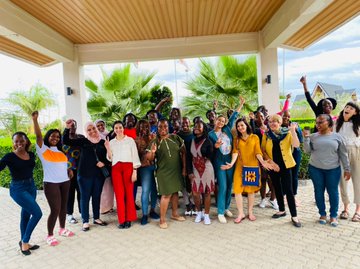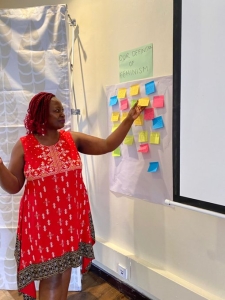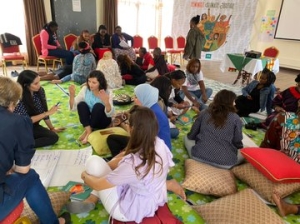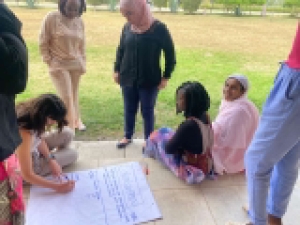
As the climate clock continues to tick ominously in our ears, announcing a developing crisis that calls for our urgent response, we, Africans on the continent, sit and contemplate an even more solemn fact in our lap. This fact is that in rooms where decisions are made and strategic policies to address the crisis are formulated, the demographics enduring the most devastating impacts, African women, girls, gender-expansive persons, people with disabilities, and the poor in rural areas, are seldom present. This means that solutions are often shortsighted and superficial and widen already existing disparities.
Against this background, Akina Mama wa Afrika(AMwA), through its flagship programme the African Women’s Leadership Institute (AWLI) undertook the task of building a critical mass of feminist leaders from marginalized groups who are equipped with the tools to challenge and transform power relations for just climate action. AMwA did this through a week-long training for 25 women from Kenya, Zambia, Tunisia, and South Africa, representing partners within the Voices of Just Climate Action programme (VCA). The training aimed to enhance the capacity of this diverse group of actors working on climate justice to adopt and integrate feminist approaches in their work, for a just climate transition.
The training commenced with a module on Personal Development facilitated by Eunice Musiime, the Executive Director of AMwA. The purpose of this module was for the participants to understand personal development as a concept and its link to feminist organizing and movement building. Eunice explained to the participants that this module is critical to their journey because personal transformation and social transformation are inextricably linked and that change begins with self. During this session, they were able to reflect on their leadership journeys and the tools they need to bring their best selves to the work that they do. With guidance from Eunice, they soulfully discussed the importance of having a personal vision and mission, networks, and a strong support system that both nourishes and holds one accountable.
“We cannot separate ourselves or our identities from the work that we do.” – Eunice

Having set the stage, the participants were ready for the next module on Feminist Theory. Godiva Akullo led this module, and its purpose was to foster a deeper understanding of feminism and to apply principles of feminist theory to challenge oppression. During the day-long session, Godiva delved into the importance of challenging the knowledge presented to us as irrefutable fact. They explained that a massive part of critical thinking is understanding that knowledge is not neutral or unbiased. One should always ask who has power over what is posited as fact and whose agenda they are pushing when they speak or write. Furthermore, they discussed patriarchy and capitalism as sites of women’s oppression and the promise of feminist theory, which makes the connection between race, gender, sexuality, capitalism, colonization, imperialism, etc., in the fight for liberation from all oppression and gives us the tools and language to challenge those systems.
Dr. Melania Chiponda took the participants through the third module – Understanding the Climate Crisis. Using several practical exercises, the participants interrogated the politics of the climate crisis and why debunking the dominant narratives is a crucial factor in the push for a just climate transition. They discussed the contribution of factors such as colonialism, capitalism, the industrial revolution, and greenhouse gas emissions to the current crisis and its devastating impacts. Additionally, Dr. Melania called for the participants to identify the link between climate justice and gender justice and to reject the notion that the same systems that caused the crisis can deliver the solutions to end it and give us a “Climate Just and Feminist Africa.”

Furthermore, the participants could deepen their understanding of the connections between the climate crisis, economic systems, and gender justice by applying principles of anti-capitalism, anti-colonialism, anti-neoliberalism, and intersectionality. This prompt came through the fourth module on Global Economic Arrangements and the Climate Crisis. During this session, participants spoke about how the climate catastrophes we witness today are being felt the hardest in countries where colonization destroyed natural resources, altered infrastructures, and compromised traditional ways of living that respect and preserve the environment. Dr. Melania emphasized the need to confront exploitative and unsustainable production patterns and environmental racism and advance community-led solutions while rejecting false and harmful responses to climate change, such as those led by the private sector, that fail to address root causes.
The participants learned through a fourth module on Legal and Policy Frameworks on Climate Change to enhance their understanding of the various legal and policy instruments at the global, regional, and national levels, with a specific focus on Kenya, Zambia, and Tunisia. They exchanged views on climate change being political, popular narratives on gender and climate change and how they come into being, how they are perpetuated, and how they materialize through climate policy. They also discussed the Intergovernmental Panel on Climate Change, its role, and its part in The United Nations Framework Convention on Climate Change (UNFCCC) spaces.
Rachael Mwikali facilitated the last module on Feminist Advocacy and Movement Building. She explained that feminist advocacy is about pushing for just societies by challenging power and oppressive systems and that such advocacy focuses on long-term change. The participants honed their skills in building advocacy strategies, setting advocacy goals, messaging, identifying allies, and influencing tactics. The 25 participants developed three action plans they will implement in Kenya, Tunisia, and Zambia.

The end of the training was bitter-sweet, with the awarding of certificates by Eunice Musiime. She appreciated the participants’ willingness to learn and dedication to the work. She also reminded the participants to use grace when they return to their work and organizations and not to feel frustrated that their peers are not on the same journey upon which they have embarked, having had their consciousness raised. Finally, the participants expressed their joy to join the trail of “AMwAzons” already at the forefront of mobilizing the citizen demand for greater transparency and accountability from their states. We departed with a shifted mindset to unravel the very norms and institutions at the core of women’s inequality and social exclusion.
BY PATRICIA MWOROZI
Economic Justice and Climate Action Intern

